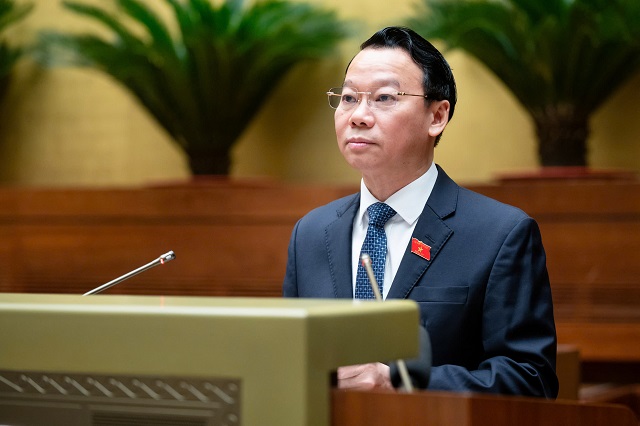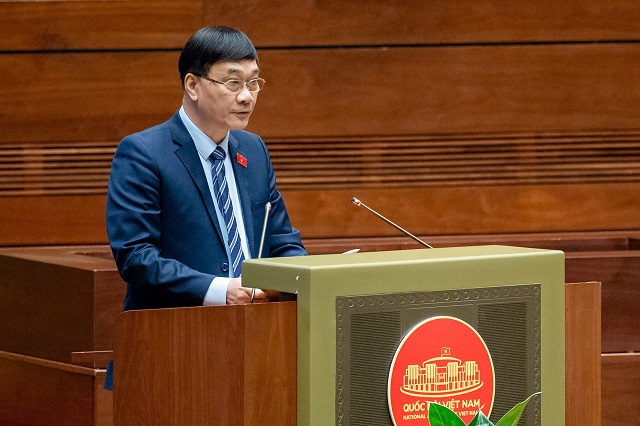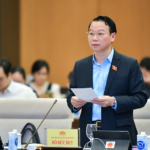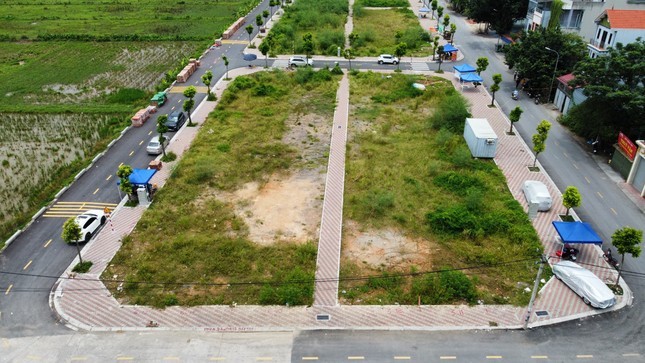There is a need to expand the conditions for transferring the right to use different types of land for commercial housing projects.
Regarding the draft resolution of the National Assembly on piloting commercial housing projects through agreements on the transfer or existing right to use land, Minister of Natural Resources and Environment Do Duc Duy stated that the resolution is built on ensuring consistency and inheriting policies implemented previously. These policies were stipulated in the 2005 Housing Law, the 2003 and 2013 Land Laws, and aim to remove legal difficulties for commercial housing projects (below the scale of urban areas)
 Minister of Natural Resources and Environment Do Duc Duy presenting the proposal
|
According to the Minister, from July 1, 2015, the 2014 Housing Law stipulates differently from the Land Law. The conditions for using land to implement commercial housing projects are to have the right to use residential land or residential land and other land. In the case of receiving the transferred right to use, it must be residential land. This narrows down the cases of implementing commercial housing projects below the scale of urban areas, especially in new areas or areas without residential land.
In reality, the limit on the land area that can be allocated to households and individuals over the years is 400m2 at most, with the remaining being agricultural land in the same land lot. Therefore, if investors transfer the right to use land in residential areas, it cannot be implemented. Moreover, most real estate projects are deployed on land that was initially not for residential purposes, and the detailed planning of the project also includes various types of land such as residential land, traffic land, green land, etc. Hence, the above regulation cannot be implemented in reality.
The Minister also stated that the draft resolution is designed to remove difficulties in the supply of real estate projects in the context of rising real estate prices, partly due to investors’ difficulty in accessing land. Therefore, it is necessary to expand the conditions for transferring the right to use different types of land to implement commercial housing projects, contributing to limiting complaints from the people; ensuring fairness in land access among investors and localities; maintaining stability in the supply of commercial housing, and promoting the development of a transparent and healthy real estate market.
In terms of scope and subjects of application, the resolution is applied nationwide to projects of real estate business organizations in cases of receiving the right to use land; having the right to use land; having the right to use land and receiving the right to use land; implementing commercial housing projects on the land area of facilities that need to be relocated due to environmental pollution or facilities that need to be relocated according to construction planning and urban planning.
Regarding the conditions for implementing commercial housing projects through agreements on the transfer or existing right to use land, the Minister said that investors implement commercial housing projects for one or more of the following types of land: agricultural land; non-agricultural land that is not residential; residential land and other land in the same land lot in the case of an agreement on the transfer of the right to use land.
The implementation of commercial housing projects must meet the following conditions: conformity with the district-level land use planning or within the construction planning and urban planning; conformity with the local housing development program and plan that have been approved; having a document from the provincial People’s Committee approving the real estate business organization to receive the transferred right to use land for projects implemented in the form of receiving the right to use land; having a document from the Ministry of National Defense or the Ministry of Public Security approving the real estate business organization to receive the transferred right to use land for national defense or security purposes, or land with a national defense or security origin, to implement commercial housing projects in accordance with the approved land use planning for housing development, in the case of projects implemented in the form of receiving the right to use land; real estate business organizations must meet the conditions prescribed by land, housing, real estate business, investment laws, and other relevant laws.
There is a need to carefully study the application of the pilot mechanism for rice-specialized land and forest land.
Reviewing the draft resolution, Chairman of the Economic Committee Vu Hong Thanh agreed with the necessity of building the resolution as proposed by the Government. The direction of piloting commercial housing projects through agreements on the transfer or existing right to use land continues to institutionalize Resolution No. 18-NQ/TW of the 13th Party Central Committee’s fifth session on “Continuing to implement the mechanism of self-agreement between people and enterprises in transferring land use rights to implement urban projects and commercial housing”; at the same time, the above pilot has been agreed upon in principle by competent authorities.
 Chairman of the Economic Committee Vu Hong Thanh presenting the verification report
|
Regarding the name of the resolution, many opinions suggested that the resolution only stipulates the pilot case of implementing commercial housing projects through agreements on the transfer or existing right to use land that is not residential land. Therefore, the name of the resolution should be “Resolution on Piloting the Implementation of Commercial Housing Projects through Agreements on the Transfer or Existing Right to Use Non-Residential Land.” Some opinions agreed with the name proposed by the Government in the proposal. This name is comprehensive, covering all cases of implementing commercial housing projects through agreements on the transfer or existing right to use land.
Regarding the scope of adjustment, many opinions agreed with the Government’s proposal, and the scope of adjustment of the resolution is implemented nationwide to ensure fairness among localities and not create a “request-approval” mechanism. Some opinions suggested that the piloting of commercial housing projects through agreements on the transfer or existing right to use land is a policy that greatly affects the investment in the construction of commercial housing and urban areas; the output of the pilot mechanism is stable and long-term commercial housing projects, which may leave consequences that cannot be remedied, affecting the interests of the people and investors.
Moreover, many localities reported no difficulties in implementing the regulations of the Land Law and the Housing Law, and some localities did not propose pilot projects or land areas; localities that implemented commercial housing projects through the form of transferring the right to use land or having the right to use land are mainly economically developed localities with a high rate of urbanization and high demand for residential land. On the other hand, during the process of reviewing and amending the 2014 Housing Law, Law No. 03/2022/QH15, and the 2024 Land Law, it was not allowed to implement commercial housing projects for land that is not yet residential. Therefore, it is suggested that the Government calculate the roadmap for implementation and only pilot it in specific localities, then summarize and evaluate before proposing to deploy synchronously in all localities nationwide.
Regarding the conditions for implementing commercial housing projects through agreements on the transfer or existing right to use land, many opinions suggested that the regulation on the types of land for piloting is too broad, including rice land, forest land, land used for national defense and security purposes, land used for religious activities, etc. Therefore, it is recommended to consider the case of specialized rice land and forest land.
The Economic Committee requested to review, study, and clarify the application of the pilot mechanism through agreements on the transfer or existing right to use land for the above-mentioned types of land; study and evaluate the application of the provisions of the draft resolution to all cases of agreement on the transfer of the right to use land or only to cases where the time of agreement on the transfer of the right to use land is from the effective date of this resolution.
In addition, study the pilot conditions based on the time of receiving the right to use land (or having the right to use land) before and after the resolution takes effect; at the same time, it is recommended to study and supplement the principle of ensuring the stability of 3.5 million hectares of rice land, a stable forest coverage rate of 42%, and strict control to ensure that there is no change of land use purpose for large areas of rice land, special-use forest land, protective forest land, production forest land, national defense land, and security land.
Unlocking Land Access: Minister Đỗ Đức Duy’s Initiative to Streamline Commercial Housing Development
According to Minister of Natural Resources and Environment Do Duc Duy, the pilot resolution on agreeing to receive land use rights aims to address the bottleneck in the approach to accessing land for commercial housing projects.
The Experimental Expansion of Commercial Housing Construction on Agricultural and Non-Agricultural Land: Concerns Over Soaring Housing Prices
Small businesses are often faced with an uphill battle when it comes to entering the market, as they lack the financial muscle to purchase land or bid on areas with development potential. Large investors with a land bank advantage for commercial projects in high-demand areas will continue to control sale prices to optimize their profits.
Unlocking the Potential: Eight Real Estate Projects in Ho Chi Minh City Freed from Legal Constraints
Since its inception, the Ho Chi Minh City Task Force has reviewed and addressed the legal issues of 30 real estate projects. Of these, 8 projects have been completely freed from legal entanglements.





















